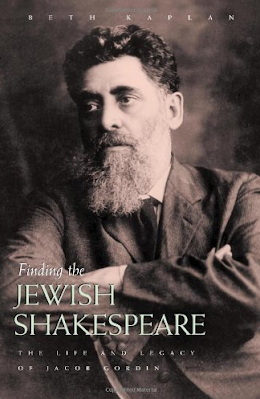A clue on Jeopardy! led me on a research path to find Der Yidisher Kenig Lir.
And I found a wonderful account of it in Beth Kaplan's Finding the Jewish Shakespeare. In a chapter entitled "A Russian Jew in America," she details the story.
Jacob Gordin is our Jewish Shakespeare, a masterful playwright working in America at the end of the eighteenth and the beginning of the nineteenth center. He interacts with Jacob Pavlovich Adler, one of the greats of the Yiddish theatre in New York around that time. The play was first produced in 1882, and it created quite a stir.
And I can't do better than provide you with a sample from that chapter (pages 57 to 60). [Warning: It's very moving. You may cry. I did.]















No comments:
Post a Comment